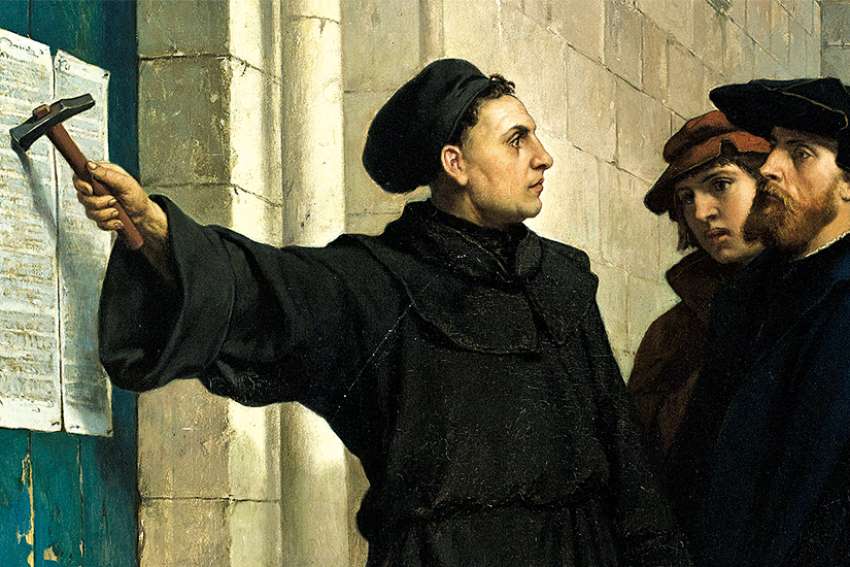Martin Luther hammers his 95 theses on a church door, as depicted by Belgian painter Ferdinand Eauwels, an act that prompted the Reformation 500 years ago.
WikiCommons
Editorial: Luther's lesson
By Catholic Register Staff
When an obscure monk named Martin Luther tacked a list of declarations onto the door of a German cathedral on Oct. 31, 1517, no one imagined his musings were about to break up the Catholic Church. All Luther wanted when penning his 95 theses was to start a conversation. In his view, the Church had lost its way.
His list was written bluntly, in Latin, the language of churchmen and scholars. It wasn’t directed at the townspeople, but was meant to spur those with influence into a dialogue about the many issues Luther believed were harming the Church, chief among them the selling of indulgences.
But where Luther sought dialogue, he found recrimination. Sides were declared, insults exchanged, penalties invoked, divisions established and the Protestant Reformation exploded across Europe, sparking rivalries, hatred and wars that reshaped the continent.
Five centuries later, some of those wounds have healed, but scores of Catholics still haven’t grasped the importance, indeed the obligation, of bridging differences through civil dialogue. As the commemoration of the Reformation began last year, Pope Francis said he believed Luther set out to “renew the Church, not divide her.” The Reformation might have been avoided — or perhaps been less cataclysmic — had Luther’s grievances led Catholics into conversation instead of vitriol.
Oftentimes today it seems Catholics, to their discredit, are still shouting at each other.
Luther came along as Europe was entering a communications revolution. The printing press was slowly gaining popularity and Luther used it deftly to disseminate what is today’s equivalent of a blog — one-page commentaries written in everyday language that received wide distribution. When the clerical and educated classes refused to discuss Church failings, Luther bypassed the hierarchy and took his views directly to the streets. His may not have been the first grassroots movement, but the world had never witnessed a more impactful one.
Five centuries later, new technologies have only intensified the need to address our differences through respectful dialogue. Instead, as it was 500 years ago, thoughtful debate is often drowned out by insults and accusations, only now the hostility is traded easily, frequently and often anonymously across the Internet.
The Reformation reminds us what can happen when conversation collides with malice. The Church still bears the scars of that hostile era. If the need for dialogue wasn’t obvious in Luther’s time, it certainly should be now.
Luther’s simple act of nailing proposals to a cathedral door didn’t cause the Reformation. The hierarchy’s punitive response to what, in many cases, were legitimate concerns became the spark that eventually found a powder keg.
It was a failure to communicate, a painful, enduring lesson in how not to get along.
Please support The Catholic Register
Unlike many media companies, The Catholic Register has never charged readers for access to the news and information on our website. We want to keep our award-winning journalism as widely available as possible. But we need your help.
For more than 125 years, The Register has been a trusted source of faith-based journalism. By making even a small donation you help ensure our future as an important voice in the Catholic Church. If you support the mission of Catholic journalism, please donate today. Thank you.
DONATE

